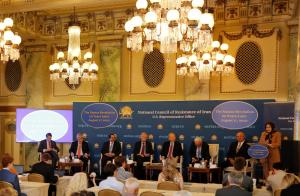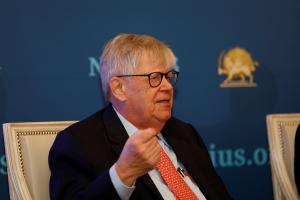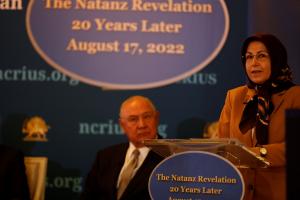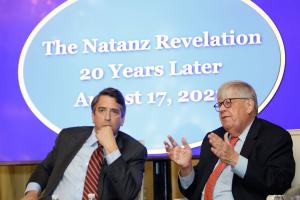IRAN: The Natanz Revelation, 20 Years Later

Joseph Lieberman, John Bolton, Robert Joseph, Dr. Olli Heinonen, General Chuck Wald, Mr. James Rosen, Ms. Soona Samsami, Mr. Alireza Jafarzadeh were among the panel on the 20th anniversary of Natanz Nuclear site revelation by NCRI

Alireza Jafarzadeh left listens to Ambassador John Bolton making remarks during the August 2022 panel by NCRI-US.

Dr. Olli Heinonen, former Deputy Director General, International Atomic Energy Agency; Distinguished Fellow, Stimson Center

Ambassador Robert Joseph, former Undersecretary of State for Arms Control and International Security

Ms. Soona Samsami, U.S. Representative, National Council of Resistance of Iran addressing the conference & General Chuck Wald, former Deputy Commander of U.S European Command
A distinguished panel of national security and non-proliferation experts addressed Tehran’s nuclear program, the JCPOA, and options for an effective Iran policy
WASHINGTON DC, DISTRICT OF COLUMBIA, UNITED STATES, August 19, 2022 /EINPresswire.com/ -- The National Council of Resistance of Iran – U.S. Representative Office (NCRI-US), held a conference on Iran on the 20th anniversary of its 2002 groundbreaking revelation of the then secret nuclear sites in Natanz and Arak in Iran.
A distinguished array of national security and non-proliferation experts addressed the significance of the NCRI's Natanz revelation, the current state of the Iranian regime’s nuclear weapons program, Ebrahim Raisi’s agenda and scorecard after one year in office, and options for an effective Iran policy.
The event was moderated by a veteran journalist, Mr. James Rosen, the chief White House correspondent for NewsMax TV.
Conference speakers were:
Honorable Joseph Lieberman, former Senator from Connecticut and former Vice-presidential nominee for the Democratic Party.
Ambassador John Bolton, former National Security Advisor, former Undersecretary of State for Arms Control and International Security, former U.S. Ambassador to the UN
Ambassador Robert Joseph, former Undersecretary of State for Arms Control and International Security
Dr. Olli Heinonen, former Deputy Director General, International Atomic Energy Agency; Distinguished Fellow, Stimson Center
General Chuck Wald, former Deputy Commander of U.S European Command
Ms. Soona Samsami, U.S. Representative, National Council of Resistance of Iran
Mr. Alireza Jafarzadeh, Deputy Director, Washington Office, NCRI
Ms. Soona Samsami welcomed the panel and opened the conference, emphasizing the role of Iranian resistance in revealing the Iranian regime's nuclear activities and agenda:
"The event today, on the 20th anniversary of the NCRI’s revelation of the then-clandestine nuclear sites in Natanz and Arak, the integral part of the Iranian regime’s nuclear weapons program in this very place, is quite timely as the U.S. and Europe are desperately trying to convince the Iranian regime to return to the JCPOA.
One can imagine, where would the nuclear weapons program of the most active state sponsor of terrorism be, absent more than 100 revelations by the NCRI over the past three decades.
Unfortunately, western powers have chosen the path of appeasement instead of firmness, offering concession after concession to the mullahs in the futile hope of convincing them to come clean.
But the indisputable fact has been and continues to remain that the regime in Tehran will never abandon its quest for a nuclear weapon because it views it as a guarantee for its survival. The 20-year cat and mouse game by the regime is an affirmation of this fact. "
Ms. Samsami concluded her remarks by offering a path towards an ultimate solution:
"In order to permanently curtail mullahs’ efforts in this regard, the west must take a firm position, the least of which is to activate the six UN Security Council resolutions. The ultimate solution to the nuclear crisis and the clerical regime’s export of terrorism and killings at home, is regime change by the Iranian people to be replaced by a democratically elected republic, a task the NCRI and the MEK are working towards based on the 10-point plan of Mrs. Maryam Rajavi for future Iran."
James Rosen opened the panel discussion, "It was on August 14, 2002, in this very hotel, that Alireza Jafarzadeh, in his capacity at the time as a spokesman and Congressional liaison for the Washington office of NCRI, held a news conference right here and disclosed to the world the existence of two previously unknown secret nuclear sites inside Iran. One was located at Natanz, and as Alireza told the world at that time, it was devoted to the project of covert nuclear fuel production."
Rosen added, "The other facility was at a town called Arak, where a heavy water reactor was under construction ... Instantly, the IAEA demanded access to these two unknown nuclear sites in Iran. The regime dragged out that process, and the next big press conference held, again here in Washington by NCRI, was in February, 2003 when again Alireza and his colleagues disclosed efforts by the Iranian regime to limit the access of nuclear inspectors from the IAEA. Finally, in June, 2003, the IAEA gained access to those sites and discovered traces of uranium particles, despite a massive effort by the regime to decontaminate the sites "
Alireza Jafarzadeh then put this history in perspective on what the situation had been if that revelation hadn't happened, as was evident in a short video:
"This revelation was significant because it actually threw off-balance the Iranian regime, which had plans for years to develop nuclear weapons. And as Hassan Rouhani, the former president of the Iranian regime said in his book, their plan was to present the world with a fait accompli, to have this Natanz facility having 54,000 centrifuges installed by March 2003. And of course, this revelation disrupted that. What’s also important is the follow-on press conferences that we had. In a matter of nine months after the Natanz revelation, we had three other major press conferences right here in Washington. First, in February 20th, 2003, we exposed the centrifuge testing facility known as Kalaye Electric Workshop in East Tehran, where they were testing centrifuges. Then in May of 2003, two other press conferences. One, the Laser Enrichment Facility in LashkarAbad near Karaj and also the Lavizan-Shian site, which is where the weaponization work was taking place."
Former National Security Advisor, Ambassador Bolton then expanded on the importance of the revelation:
"... this revelation about Natanz for the U.S. government was incredibly important, because ... There was skepticism that they had a nuclear weapons program at all. And while I won’t get into what the state of knowledge of the U.S. government was at that time, I can tell you when Alireza had his press conference and word about the enrichment facility at Natanz got out and was increasingly well-understood, it had a dramatic impact publicly in this country and I think around the world, because the palpable evidence that was presented made it inescapable that Iran had an advanced, sophisticated nuclear program that was almost surely pointed to the development of nuclear weapons."
Ambassador Bob Joseph who was then Special Assistant to the President and Senior Director for non-proliferation at the National Security Council in the White House, gave another look at the significance of the revelation and where it is 20 years after.
"With the briefing, Iran nuclear—which had been a significant concern—became a priority. The revelations I think really did have a significant impact on how we thought about Iran and the need to respond to the Iranian program. It initiated the IAEA inspections. It added to the sense of urgency to create new tools, such as the Proliferation Security Initiative, and of course it led to the negotiations beginning with the EU3 and the cat and mouse plan that’s been played for 20 years in the negotiating context."
Dr. Olli Heinonen, who was the deputy director general of the IAEA, and head of its Department of Safeguards, did end up going to Natanz. He presented the impact of this revelation from IAEA angle:
"IAEA was aware about some aspects of uranium enrichment in Iran ... But the magnitude was different, particularly when we saw the satellite images from Natanz. Because Natanz was not known to us in August 2002."
Senator Lieberman who was then in the United States Senate gave account on how the revelation impacted policies in Congress:
"I’m speaking from the perspective of somebody who was in Congress then ... Alireza’s NCRI report in August 2002, was jarring and riveting. ... What NCRI did here in this hotel 20 years ago, was really extraordinary, and not the intelligence agency of our government, or allied governments with great intelligence agencies. This was a nongovernmental organization that revealed something that a lot of us, including on Capitol Hill, ... we suspected but we didn’t have that evidence about Natanz in Iran."
Senator Lieberman added, it is "quite remarkable, really, that a nongovernmental organization was able to do that. The other thing it said to us, although we didn’t give it enough appreciation then, is that the NCRI was an incredible organization with significant support in Iran. You don’t issue a report that Alireza did here 20 years ago by making it up at a desk in Washington. This came from people inside Iran, inside the Iranian government, who were resistors, courageous resistors."
General Wald gave a military perspective on how the revelation started a series of activities which continues to date:
"Thanks to the NCRI for what you continue to do," adding that "What I am saying though is that there’s a military aspect to this part of the whole equation. Iran needs to realize there is an alternative to bad behavior, last resort, but an alternative. We’ve been planning for that for 20 years, and it continues today."
The Panel's discussion then turned to what comes next.
Ambassador Joseph:
"... Because I’ve come to the conclusion that as long as this regime remains in power, the nuclear program will continue to advance forward." Ambassador Joseph further clarified his point of view, "Let me just add that I’m talking about regime change from within. I’m not talking about the U.S. military invading Iran. This is about allowing the people of Iran to achieve the goal that they seek, and that is democracy and human rights and basic dignity. That’s what this is all about. I think we have stood in the way of them achieving that goal. This is regime change like we had in 1776 in our country. This is not about a foreign invasion."
Senator Lieberman pointed:
"I see the beginning of a return to the bipartisanship on Iran policy, probably most visible or tangible in the Bob Menendez-Lindsey Graham legislation put in recently. ... we tried engagement and we’re now at a point where we’re living Einstein’s definition of insanity. You continue to repeat the same thing with the same awful result. Get up, leave the table, and what do we do? We’ve got to say to ourselves honestly, this regime in Iran will never change. So, our policy is to change the regime, support the people of Iran, and incidentally that has to be coupled with exactly what General Wald, ambassador said and John, which is listen, to threaten, to try to kill John Bolton and the others, that’s an act of war." Senator Lieberman added, "we ought to make clear to the Iranian government that if they continue to do that kind of thing to our citizens, they’re going to feel the strength and force of the American military on them in their country. And then we ought to stand with the people of Iran, including NCRI, which is the strongest resistance group, just as we stood with the citizens, the freedom fighters in the former Soviet Union, and hopefully with the same result. This regime cannot be changed. It has to be put into the dustbin of history."
Ambassador Bolton followed up and added, "Understanding the nature of the regime itself is critical to coming to a realistic American policy, which ultimately has to be there’s not going to be peace and security in the Middle East while this regime is still in power in Tehran."
When attention turned to question of regime change, Mr. Jafarzadeh articulated Iranian Resistance position and what the Iranian people expect from the west. "Certainly the sensible support is not about arms or money or boots on the ground. It’s actually the political support. But it starts with standing firm against the regime, because if they are trying to reach out to the regime they will never look at the resistance. That’s the story of the past 40 years. Always investing on the regime. I think with the rise of Raisi at the helm, the message should be received in Washington and every capital in the world that this regime is in big trouble, otherwise Raisi would not have been put in that place. They are after the bomb as the only way for survival, the nuclear bomb. And any negotiations that is being done is actually feeding the Iranian regime. The best way to help the resistance is stand on their side politically, condemn every act the regime does against the people, against the protestors, and recognize their right to overthrow the regime."
Ambassador Joseph emphasized the role of Iranian people and their organized resistance:
"And I agree with the Senator, I think the key here is the Iranian people. It is the clearest threat, the gravest threat to the administration. And at a minimum we should not stand in the way of the people who seek democracy, basic human dignity and human rights."
When asked, Mr. Jafarzadeh clarified why Iran will not become another Libya, after the fall of the ruling regime.
"First of all, in terms of the issue of the regime change, certainly nobody is talking about any other scenarios except indigenous regime change by the people of Iran. And it’s something that is happening. It’s going on right now, and especially since 2018 the vast majority of the people of Iran have been in the streets. Some of the uprisings like the one in 2019, involved over 200 cities. The regime had to kill 1,500 people in two days by shooting directly at them in the streets. The people have already rejected this regime. So there’s a huge asset out there that no one needs to invest in anything else."
Jafarzadeh added, "Second, in response to what’s going to happen afterwards, unlike any other countries like in Syria, Libya and other places, that there were foreign players that were trying to impact the situation, and most of them actually were connected to Tehran, they were the ones that were trying to take advantage of the post fall of those dictatorships; in the case of Iran it’s exactly the opposite. The main agitator, which is the regime itself, is now going to be overthrown.
Then, there’s an alternative, an organized opposition with a structure on the ground. This network of the resistance that exposed all of the major nuclear sites of Iran, as well as their terror operations, are the ones that are organizing or leading or igniting those protests inside the country, it has a very expansive network with organizational capabilities, not just inside Iran but also outside of Iran. There is a parliament in exile. There is a structure on the ground. So, when the regime falls, you don’t need to worry because what’s going to be knocked down are the Revolutionary Guards, who are the killers and murderers, or the (Basij) and others. When you give the opportunity to the people with a history of opposition then the outcome is not going to be Libya, it’s not going to be Syria."
NCRI-US
National Council of Resistance of Iran - US Rep.Office
+1 202-747-7847
email us here
Visit us on social media:
Facebook
Twitter
NCRI-US Panel Discussion on the 20th anniversary of Natanz Nuclear Site Revelation by Iranian Resistance. Review of the Past & the Path to a non-Nuclear Iran
Legal Disclaimer:
EIN Presswire provides this news content "as is" without warranty of any kind. We do not accept any responsibility or liability for the accuracy, content, images, videos, licenses, completeness, legality, or reliability of the information contained in this article. If you have any complaints or copyright issues related to this article, kindly contact the author above.



